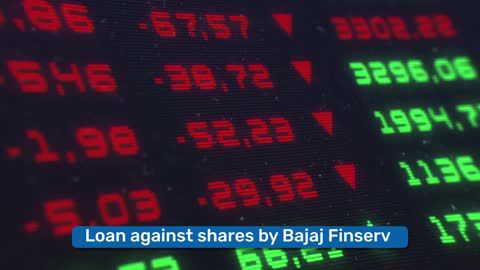Need urgent funds but do not want to sell your shares? A loan against shares could be the solution you are looking for. It allows you to use the value of your equity investments to raise funds without liquidating them. Whether you are facing a medical emergency, expanding your business, or simply need extra liquidity, this option gives you access to capital while keeping your long-term investments intact. Let us explore how it works, current interest rates, and the best options available to you.
Need quick funds without selling your shares? Apply online for a loan against shares and get funds in 24–48 hours* with minimal paperwork. Apply now
What is a loan against shares?
A loan against shares is a type of secured loan where you pledge your listed equity shares in return for a loan. You continue to own the shares, and in some cases, may even receive dividends or benefit from capital appreciation while the loan is active. The amount you can borrow depends on the value of the shares and the lender’s loan-to-value (LTV) policy. The higher the share value and the better your credit profile, the larger the loan amount. This type of loan is ideal for investors who need short-term liquidity but do not want to disturb their portfolio.
Current interest rates for loan against shares (2025)
Here is how different lenders stack up in terms of interest rates in 2025:
| Lender | Interest Rate (per annum) | Loan Amount Range |
|---|---|---|
| Bajaj Finance Limited | 8% - 15% p.a. | Rs. 10,000 – Rs. 1,000 crore |
| HDFC Bank | 10% – 12.5% p.a. | Rs. 5 lakh – Rs. 20 crore |
| ICICI Bank | 10.5% – 13.0% p.a. | Rs. 5 lakh onwards |
| Axis Bank | 11.0% – 13.5% p.a. | Rs. 5 lakh onwards |
| Kotak Mahindra Bank | 10.25% – 12.75% p.a. | Rs. 10 lakh onwards |
| SBI Capital Markets | 9.95% – 12.25% p.a. | Rs. 5 lakh – Rs. 25 crore |
Comparison of Loan-to-Value (LTV) ratios across lenders
LTV ratio is the percentage of your shareholding’s market value that lenders allow you to borrow. Here's how the top lenders compare:
| Lender | Maximum LTV ratio | Remarks |
|---|---|---|
| Bajaj Finance Limited | Up to 50% | Offers higher LTV on select shares |
| HDFC Bank | Up to 50% | Based on approved share list |
| ICICI Bank | Up to 50% | Custom limits based on risk rating |
| Axis Bank | Up to 55% | Adjusted based on share volatility |
| Kotak Mahindra Bank | Up to 50% | Subject to client profile |
| SBI Capital Markets | Up to 50% | Market value-based lending |
Processing fees and additional charges breakdown
Besides interest rates, lenders also levy processing and service fees. Here is a comparative breakdown:
| Lender | Processing fees | Other charges |
|---|---|---|
| Bajaj Finance Limited | Up to 4.72% | Minimal documentation, transparent terms |
| HDFC Bank | Rs. 999 – Rs. 5,000 | Annual renewal charges apply |
| ICICI Bank | 0.5% – 1% of loan amount | May include pledge and prepayment fees |
| Axis Bank | 1% of loan amount | Overdue interest and administrative charges |
| Kotak Mahindra Bank | Rs. 3,500 – Rs. 7,000 | Legal and stamp duty charges |
| SBI Capital Markets | Rs. 2,000 + GST | Annual maintenance fees possible |
Trying to reduce extra costs? Choose a lender with low processing fees and no hidden charges for better overall value. Apply now
Eligibility criteria for availing loan against shares
Meeting the lender’s eligibility criteria is the first step. Here’s a simple checklist for loan against shares eligibility:
- Age: Between 18 and 90 years
- Employment: Salaried, self-employed, or business owner
- Ownership: Holding of approved listed shares
- CIBIL score: Generally not required
- KYC-compliant: PAN and Aadhaar must be valid and active
Some lenders may also check your income or business turnover, especially for large-value loans.
Not sure if you are eligible? Use an online eligibility calculator to find out instantly before applying.












